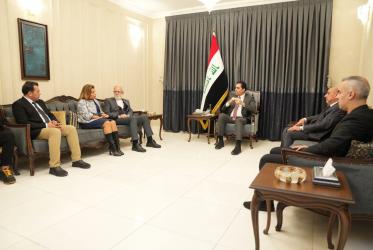Letter to WCC member churches and Central Committee members, specialized ecumenical agencies, national and regional councils of churches, 24 October 2002.
Dear Brothers and Sisters in Christ,
As the United Nations Security Council continues its deliberations this week on Iraq and the threat of war in that country persists, the World Council of Churches (WCC) looks to you, the churches, national and regional councils and specialized ecumenical agencies from the United Nations Security Council member states, for guidance and cooperation in averting this war. It is in this context that I share with you the contents of the WCC General Secretary's letter to members of the United Nations Security Council sent October 15, 2002 (attached).
The General Secretary's letter conveys three main policy elements of the WCC, based on the WCC Central Committee Statement of September 2, 2002:
The need to uphold the international rule of law, resist pressures to join in preemptive military strikes against a sovereign state and to search for solutions by non-military means. The WCC opposes unilateral military action by any state and deplores the view held by many of the most powerful nations in the world that war is an acceptable foreign policy instrument, in violation of both the United Nations Charter and Christian teachings.
Deep concern for the potential human costs of a new war and the large-scale deplacement of Iraqi citizens. Action by Churches Together (ACT), on behalf of the WCC, is currently preparing for a potential crisis in Iraq in co-operation with the Middle East Council of Churches. Together they are working on a regional emergency preparedness plan in consideration of the potential magnitude of the conflict and the humanitarian consequences both in Iraq and throughout the region.
Caution against the potential social, cultural, and religious as well as diplomatic long term consequences of such a war, especially a unilateral one. The WCC, through its Inter-Religious Relations team, recently hosted an international consultation on "Christians and Muslims in Dialogue and Beyond" which addressed how the already considerable division between East and West would be exacerbated by a conflict with Iraq. The conference delegates subsequently called on political leaders to resist the temptation to resort to simplistic and populist assignation of blame and demonisation of whole communities, and to resist the identification of violence and terrorism on any one particular religion or community; and for leaders of all religions at all levels to draw attention to the social, economic and other injustices which influence their environment and to resist the exploitation of these injustices to rouse religious hatred.
The WCC has been encouraged by the many actions and statements made by ecumenical councils and member churches, as well as various Christian peace movements, expressing consternation with recent political developments relating to the threat of war against Iraq (ref.: compilation attached). The next issue of "Behind the News", due this week, will also include these actions for your information and further use.
In order for the WCC to ensure a coherent and collective ecumenical response, we urgently request information on any actions or advocacy plans you may have to help avert a military strike against Iraq. We would also welcome any suggestions you would like the WCC to further consider.
I pray that God will guide your actions in these troubled times.
Sincerely,
Peter Weiderud
Director
Commission of the Churches on International Affairs




